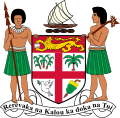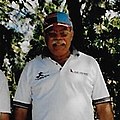| Prime Minister of Fiji | |
|---|---|
| Paraiminisita ni Viti (Fijian) फिजी के प्रधानमंत्री (Fiji Hindi) | |
 | |
 | |
| Style | The Honourable [1] |
| Status | Head of government |
| Member of | Cabinet |
| Seat | Government Buildings |
| Term length | Four years |
| Precursor | Chief Minister of Fiji |
| Inaugural holder | Kamisese Mara |
| Formation | 10 October 1970 |
| Deputy | Deputy Prime Minister of Fiji |
| Salary | FJ$ 320,000/US$ 145,100 annually [2] |
| Website | www |
 |
|---|
The prime minister of Fiji is the head of government of the Republic of Fiji. The prime minister is appointed under the terms of the 2013 Constitution. The prime minister is the head of the Cabinet and appoints and dismisses ministers.









